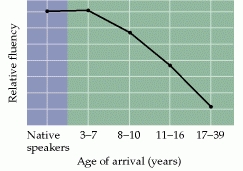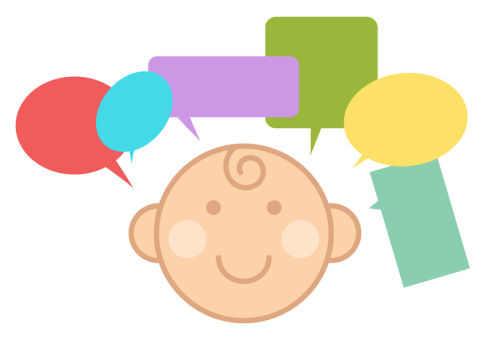As a linguistics major, I cannot express how many times I’ve said “Linguistics is the scientific study of language. Which, if you think about it, is actually the scientific study of what makes us human, what separates us from the rest of the animal kingdom. Our ability to communicate abstractly and complexly has been a great advantage.”
I began university my freshman year with literally no idea what I’d major in. I knew some topics that I enjoyed – communication, psychology, ecology – but I didn’t feel a passion that I felt could carry me through life. I took a few interesting intro-level classes, and LING101 opened my mind to an entire subject matter that I’d completely taken for granted before.
Language is awesome. The fact that human beings can communicate with sound and other animals can’t… well that is a whole other situation on its own. The process that goes on in an infant’s brain during its first year of life is so fascinating, and also explains a lot about why adults are awful at language acquisition. Every human being is predisposed to language abilities, which is simply an amazing universal feat that unites us all. Not to mention, each of the 7,000 world languages are theorized to be systematically oriented on the basis of “Universal Grammar”.

For these reasons, and many more, I am obsessed with language in the human mind, and the processes that come with its application in social contexts, as well as what is going on beneath the surface all the time. Without language… what would the inside of your head be? What would the world be? How would you think? Would thoughts even be an option?
Without digging too deep (linguistics can go VERY deep), I’d like to share some of the interesting tid bits of information that I have gathered in my year as a student. Language rules our lives whether we are aware of it or not, and this gives linguistics a very obvious feeling once it is put in front of our faces.
Here are some of the notable basics of linguistics:
- All human beings have the innate ability to acquire language. This is similar to how birds simply know how to fly. Parents do not teach babies how to talk, the systems in the brain allow the child to gradually develop language ability through out childhood.
Because of this, babies can actually learn languages with native-like ability very easily, as long as they are consistently exposed to said language. Hypothetically, babies could easily learn an unlimited number of languages in their critical period (which lasts until age 7), but most researchers realistically recommend a maximum of four simultaneously.
Chart displaying the critical period and a decline in language ability at age 7 (click to read more)
Babies have amazing language abilities, especially in their first year of life. They are aware of speakers of different languages, and are able to pick up on the nuances in each language. For example, adult Japanese speakers do not distinguish between what English speakers consider the sounds [r] and [l]. Infants in a dominantly Japanese environment, however, can perceive the difference between the two sounds despite never having heard it in their environment.
Children are easily capable of being bilingual, and bilingualism is a massive benefit. People that were exposed to a language as an infant or young child, but learn a different native language, are actually better at learning that “past” language later in life. Bilingual babies and children tend to be better multi-taskers as well as more self-aware. Language has abilities beyond what most realize.

- Language is lateralized in the brain (of most people), but it can have far-reaching benefits for all language users. For the majority of the world, language is lateralized in the left hemisphere of the brain and concentrated in two centers called Broca’s area and Wernicke’s area. As you may know, our bodies are cross-wired to our brains, meaning stimuli that hits the right side of our body goes to the left hemisphere of our brain first, and vise-versa. This means that if someone speaks into your right ear, you’ll likely understand them easier/faster, because the input goes directly to the language centers in the left hemisphere of the brain.
About 25% of the left-handed population don’t have their language lateralized in the left hemisphere, it’s actually scattered about the brain or more heavily in the right hemisphere (Source). There may be no real connection between these facts, but I have developed a personal theory that left-handed people may be more adept at language learning because of this.
I took a class called “bilingualism” last semester, and it was the most linguistically diverse environment I had ever been in. Everyone in the class was bilingual (I was the most inexperienced), and there were at least 5 people who spoke 4 languages, with 3 other people speaking 6 languages (in Kansas! Who’d have thought?) . And, it gets better… 6/20 people in that class were left-handed. Which is notable if you ask me.
So, a person’s native language is lateralized, usually in the left-hemisphere. But when someone is learning a second language, the language is actually processed in the right hemisphere. Our brains recognize language completely differently after the critical period. What is even more amazing – once fluency is developed in a second language, it “moves” to the left hemisphere, and actually will overlap with the person’s native language.
One other really cool thing about language and the brain: Research has found that bilingualism can prevent the onset of Alzheimer’s by about 4 years. In today’s society, 4 years could be enough time to find the cure to Alzheimer’s. Just saying. - All languages are equally complex and rule-governed. The concept of “grammar” isn’t one that linguists pay much attention to. Linguistics is most concerned with what is actually said by speakers of each language, which is actually very systematic. As a child grows, its brain develops a very strict structure for how language works, but the rules themselves are subconscious.
All speakers speak a dialect. It is a misconception to believe that you speak the “standard” or “right” way… because it simply doesn’t exist. There isn’t one “pure” form of any language. There are ways of speaking that are socially encouraged, and ways that are oppressed… but that is for another blog post. Basically, all languages operate on the basis of Universal Grammar, and that is why babies can magically learn them, and linguists can systematically analyze them across the board.
Languages themselves are always changing and influencing one another. If you look at the varieties of English around the globe, it’s honestly quite amazing, because English has spread rapidly and been influenced by each languages native to the region it is in. An unfortunate side-effect of this global language (or lingua franca), is that many languages are dying out as a result. The economic and social prestige associated with English is appealing to many, but can quickly bring other languages to extinction. It’s estimated that 50% of the 7,000 languages on this planet will be gone by the end of the century. That’s a tragedy.Many with the privilege of language do not consider what’d it would be like to live somewhere where most people speak a different language, or to have your language systematically torn from your identity. Language is one of the most valuable resources of today’s world (in my opinion), and it’s not something to be taken for granted. Only about 20% of the US population is bilingual, many of which are recent immigrants that will likely lose the native ability within generations (Source). Compare this to the world, where 50% of the global population speaks at least two languages. It is vital to support language learning, especially of those oh-so-special languages that could be gone from our world at any point. Language is a vital piece of one’s culture and identity and it must be celebrated and encouraged.
Well, there you have it folks, my first all-out linguistic-nerd post. I hope you enjoyed, as I definitely enjoyed trying to craft the most interesting, informative, and readable post that I could. If anybody has questions or wants to talk to me about my favorite thing – please do!
Further reading:
https://www.linguisticsociety.org/
http://www.onlineuniversities.com/blog/2011/05/40-fascinating-lectures-for-linguistics-geeks/



Nice post! You got it spot on. Check out my blog for similar stuff!
LikeLiked by 1 person
I’m glad to see there’s another language blog wandering around on here. I’ll definitely stop by 🙂 Thank you for your time.
LikeLiked by 1 person
Good Read.
LikeLiked by 1 person
Thank you! 🙂
LikeLiked by 1 person
Fascinating read… 🙂
LikeLiked by 1 person
Thank you! It is a fascinating topic indeed 🙂
LikeLiked by 1 person
Reblogged this on Dream Big, Dream Often.
LikeLiked by 1 person